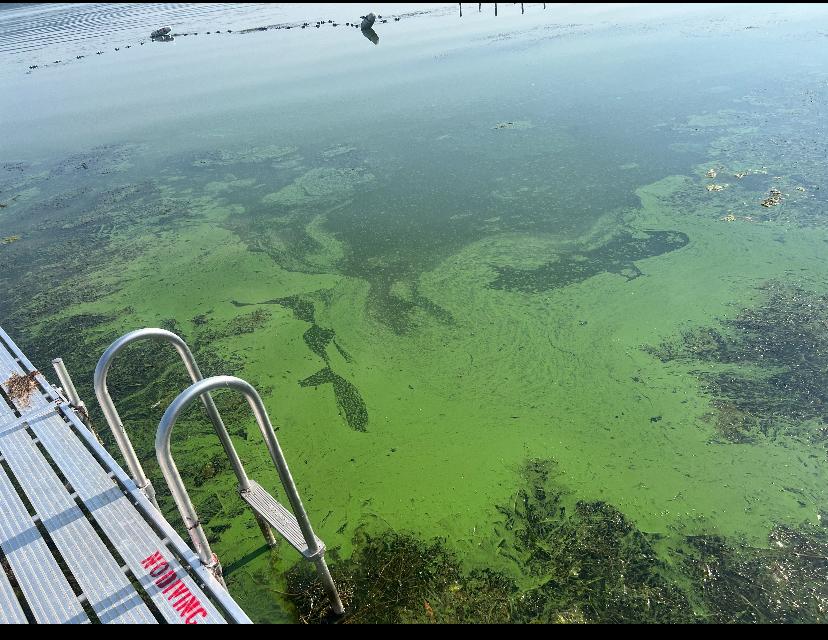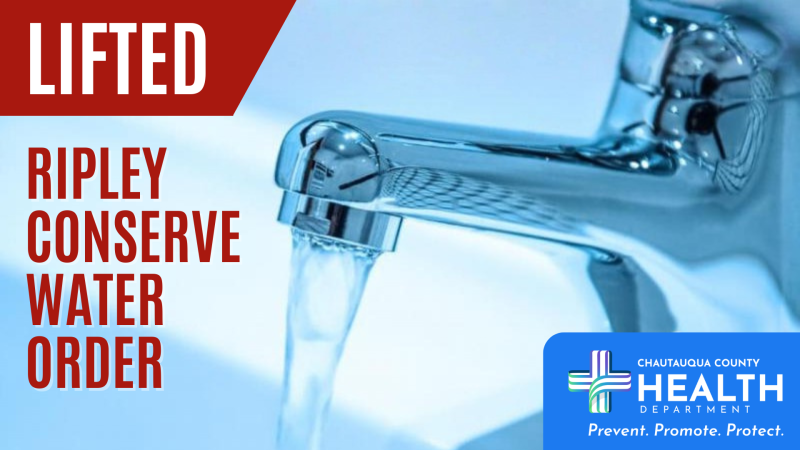
MAYVILLE, N.Y. – The Chautauqua County Health Department (CCHD) encourages all residents and visitors to stay informed about Harmful Algal Blooms (HABs) and to exercise caution when enjoying recreational activities in our lakes. In alignment with its mission and vision, CCHD is committed to preventing water-related illnesses and injuries, promoting safe outdoor recreation, and protecting the health of Chautauqua County’s lakes. While HABs are most commonly seen in mid to late summer across Chautauqua County and New York State, they can occur at any time of year. Conditions on the water can change rapidly, and even a small bloom can quickly grow due to shifting weather patterns and lake currents.
KNOW IT
Blue-green algae, or cyanobacteria, are naturally present in lakes and ponds. When nutrient-rich runoff, warm water, and sunshine are present, visible blooms or HABs can form. These HABs often appear as floating scums or rafts and may resemble pea soup or paint spills in vivid colors such as blue-green, green, yellow, white, brown, purple, or red. Blooms typically form in nearshore areas, where conditions are more favorable.

HABs are a public health concern because they may produce toxins harmful to humans and animals. People and pets can be exposed by touching, swallowing, or inhaling contaminated water during recreational activities, by using untreated surface water around the home (e.g., for garden watering), or through improperly treated drinking water. Chautauqua County’s major municipal water systems test for toxins when blooms are detected near their water intakes.
AVOID IT
Jessica Wuerstle, Director of Environmental Health for Chautauqua County, advises the public to take simple but important precautions:
- Avoid swimming, wading, or boating in areas with visible blooms, surface scums, or discolored water. This applies to adults, children, and pets.
- Do not fish or eat fish from waters affected by visible blooms or scums.
- Obey beach closures, health advisories, signs, and public notices. Never swim at a beach that is closed.
- Never use untreated surface water—with or without a bloom—for drinking, food preparation, cooking, or making ice.
If a person or pet comes into contact with a suspected bloom, rinse immediately with clean water. Seek medical attention if symptoms develop, including nausea, vomiting, diarrhea, skin rashes, allergic reactions, or breathing difficulties.
REPORT IT
Suspected HABs can be reported for testing to the New York State Department of Environmental Conservation (DEC). If you observe a suspicious bloom, you can report it directly through the DEC’s online reporting form at: https://survey123.arcgis.com/share/66337b887ccd465ab7645c0a9c1bc5c0
“Chautauqua County is a wonderful place to live, work, and play. Our lakes are a great natural resource for outdoor physical activity and offer a wide range of opportunities for enjoyment, from scenic views and swimming to fishing, kayaking, and other water activities,” states Public Health Director Lacey Wilson. “While it's important for both residents and visitors to exercise caution when enjoying our waterways, we encourage everyone to experience these natural amenities safely and responsibly.”
ONGOING MONITORING & IMPROVEMENT EFFORTS
New York State and Chautauqua County are actively working to reduce nutrient pollution, particularly phosphorus and nitrogen, which contribute to HABs. Watershed management plans have been developed for several lakes, including Chautauqua Lake and Findley Lake. While improvements in water quality are expected over time, results may take several years to be fully realized.
The DEC continues to investigate HAB reports and support research to better understand bloom dynamics and toxin production.
Locally, the Chautauqua County Health Department monitors all permitted bathing beaches for both HABs and E. coli bacteria. Beaches are closed whenever water quality falls below safety standards or a HAB is confirmed, in order to protect public health.
For updates on beach water quality and to access additional information about HABs, please visit HealthyCHQ.com.
Stay Informed. Stay Safe. Enjoy CHQ Lakes.
About Chautauqua County Health Department - The Chautauqua County Health Department is the leading Public Health organization in Chautauqua County dedicated to the support of the community’s health. The Health Department takes innovative approaches to provide technical assistance to partner organizations, and offers various programs and services in order to help prevent disease, protect the public’s health and promote our community’s overall health and wellness. For more information visit www.HealthyCHQ.com.







